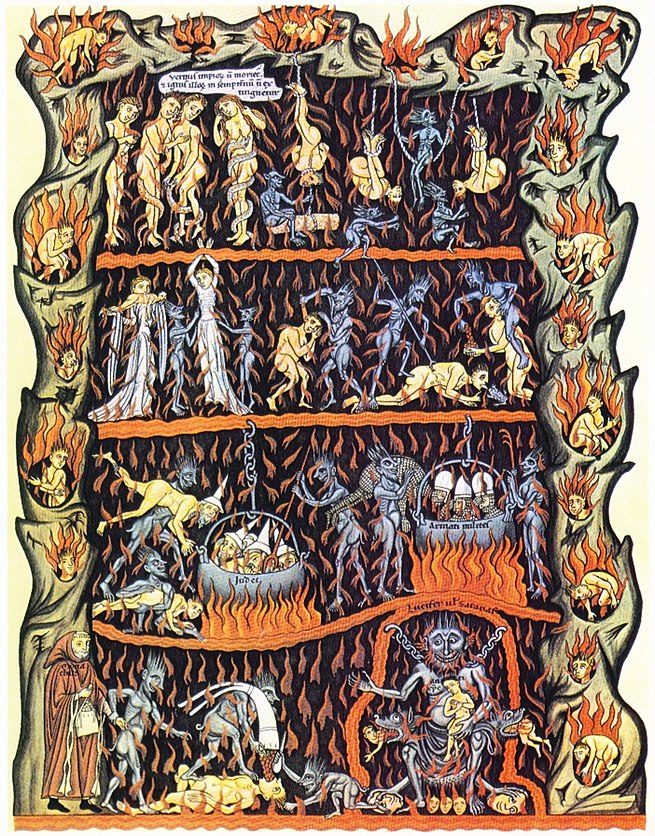Main Difference
The main difference between Hell and Purgatory is that the Hell is a mythological place of, often eternal, suffering and Purgatory is a intermediate state for souls undergoing purification and destined for Heaven, affirmed to exist by some Christian denominations including the Roman Catholic Church.
-
Hell
Hell, in many religious and folkloric traditions, is a place or state of torment and punishment in an afterlife. Religions with a linear divine history often depict hells as eternal destinations while religions with a cyclic history often depict a hell as an intermediary period between incarnations. Typically these traditions locate hell in another dimension or under the Earth’s surface and often include entrances to Hell from the land of the living. Other afterlife destinations include Heaven, Purgatory, Paradise, and Limbo.
Other traditions, which do not conceive of the afterlife as a place of punishment or reward, merely describe hell as an abode of the dead, the grave, a neutral place located under the surface of Earth (for example, see Sheol and Hades).
-
Purgatory
In Roman Catholic theology, purgatory (Latin: Purgatorium, via Anglo-Norman and Old French) is an intermediate state after physical death in which some of those ultimately destined for heaven must first “undergo purification, so as to achieve the holiness necessary to enter the joy of heaven,” holding that “certain offenses can be forgiven in this age, but certain others in the age to come.” And that entrance into Heaven requires the “remission before God of the temporal punishment due to [venial] sins whose guilt has already been forgiven,” for which indulgences may be given which remove “either part or all of the temporal punishment due to sin,” such as an “unhealthy attachment” to sin. Only those who die in the state of grace but have not yet fulfilled the temporal punishment due to their sin can be in purgatory, and therefore, no one in purgatory will remain forever in that state nor go to hell. The notion of purgatory is associated particularly with the Latin Rite of the Catholic Church (in the Eastern sui juris churches or rites it is a doctrine, though it is not often called “purgatory”, but the “final purification” or the “final theosis”).
Although denying the existence of purgatory as formulated in Roman Catholic doctrine, the Anglican and Methodist traditions along with Eastern Orthodoxy, affirm the existence of an intermediate state, Hades, and thus pray for the dead, Eastern Orthodox Churches believe in the possibility of a change of situation for the souls of the dead through the prayers of the living and the offering of the Divine Liturgy, and many Orthodox, especially among ascetics, hope and pray for a general apocatastasis. Judaism also believes in the possibility of after-death purification and may even use the word “purgatory” to present its understanding of the meaning of Gehenna.
The word purgatory has come to refer also to a wide range of historical and modern conceptions of postmortem suffering short of everlasting damnation and is used, in a non-specific sense, to mean a condition or state of suffering or torment, especially one that is temporary.
-
Hell (proper noun)
In various religions, the place where some or all spirits are believed to go after death
“Some religious people believe that all the followers of the other religions go to hell.”
-
Hell (proper noun)
The place where devils live and where sinners suffer after death
“May you rot in hell!”
-
Hell (noun)
A place or situation of great suffering in life.
“My new boss is making my job a hell.”
“I went through hell to get home today.”
-
Hell (noun)
A place for gambling.
-
Hell (noun)
An extremely hot place.
“You don’t have a snowball’s chance in hell.”
-
Hell (noun)
Used as an intensifier in phrases grammatically requiring a noun
“I’m as mad as hell and I’m not going to take it any more.”
“What the hell is wrong with you?!”
“He says he’s going home early? Like hell he is.”
-
Hell (noun)
A place into which a tailor throws his shreds, or a printer his broken type.
-
Hell (noun)
In certain games of chase, a place to which those who are caught are carried for detention.
-
Hell (interjection)
Used to express discontent, unhappiness, or anger.
“Oh, hell! I got another parking ticket.”
-
Hell (interjection)
Used to emphasize.
“Hell, yeah!”
-
Hell (interjection)
Used to introduce an intensified statement following an understated one; nay; not only that, but.
“[Do it, or, r]est assured, there will be no more Middle Eastern crisis – hell, there will be no more Middle East!”
-
Hell (verb)
To add luster to, burnish (silver or gold).
-
Hell (verb)
To pour.
-
Purgatory (noun)
alternative case form of Purgatory
-
Purgatory (noun)
Any situation where suffering is endured, particularly as part of a process of redemption.
-
Purgatory (adjective)
Tending to cleanse; expiatory.
-
Hell (noun)
a place regarded in various religions as a spiritual realm of evil and suffering, often traditionally depicted as a place of perpetual fire beneath the earth where the wicked are punished after death
“irreligious children were assumed to have passed straight to the eternal fires of hell”
-
Hell (noun)
a situation, experience, or place of great suffering
“I’ve been through hell”
“he made her life hell”
-
Hell (interjection)
used for emphasis or to express anger, contempt, or surprise
“who the hell are you?”
“oh, hell—where will this all end?”
-
Purgatory (noun)
(in Catholic doctrine) a place or state of suffering inhabited by the souls of sinners who are expiating their sins before going to heaven
“the punishment of souls in purgatory”
“all her sins were forgiven and she would not need to go to Purgatory”
-
Purgatory (noun)
mental anguish or suffering
“this was purgatory, worse than anything she’d faced in her life”
-
Purgatory (adjective)
having the quality of cleansing or purifying
“infernal punishments are purgatory and medicinal”

